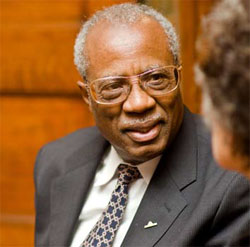Educating Citizens for a Global Era
How to inculcate new citizens with shared national values, without marginalizing minority cultures? The answer, according to James Banks, is at least in part to focus on values of tolerance and inclusion.
At TC’s annual Tisch Lecture this past fall, Banks—the Kerry and Linda Killinger Professor of Diversity Studies and Director of the Center for Multicultural Education at the University of Washington—argued against what he called the prevailing “liberal assimilationist” model of citizenship education, which he said requires people to give up their cultural identities in order to fully participate in civil society. Under a multicultural model, he said, minority groups and their cultures would be viewed as enriching instead of threatening to the mainstream.
What form would such citizenship take? Banks would require students to do more than simply memorize facts about their form of government. The new system would instead demand that both teachers and students learn to recognize and fight racism. New teaching materials would preserve diverse ethnic and cultural perspectives and ensure that students from diverse backgrounds enjoy equal status in the classroom.
The result would be citizens, both new and longstanding, who are equipped with the knowledge, skills and values to challenge inequality throughout the world and create just and democratic multicultural societies.
Banks is considered one of the founders of the multicultural education fields. His books—including Diversity and Citizenship Education: Global Perspectives, which examines the tension between a unified political culture and a racially and ethnically diverse society in 12 nations—have a powerful influence in public schools, colleges and universities worldwide. Banks is the editor of the Multicultural Education Series at Teachers College Press and is also editing The Routledge International Companion to Multicultural Education (Routledge, 2009).
Published Tuesday, Apr. 1, 2008
